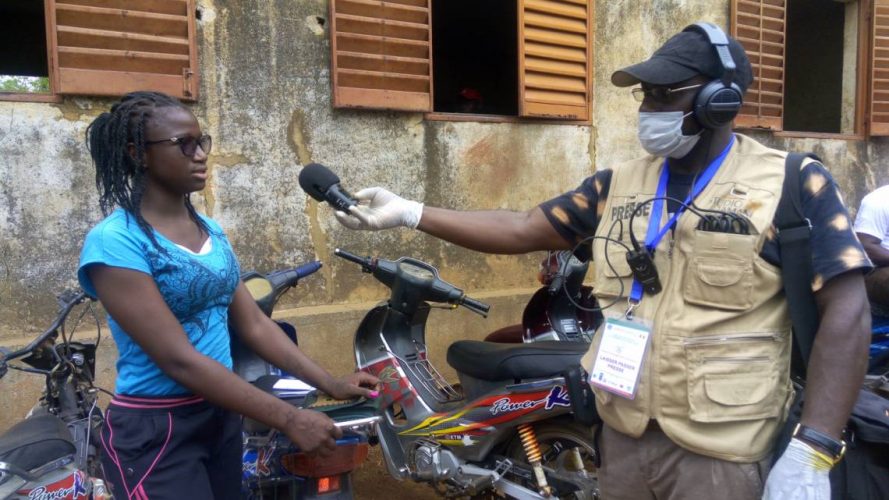As Covid-19 progresses in Africa, Fondation Hirondelle’s media and news programs are organizing to protect their staff and adapting their content to inform local populations about the pandemic. An overview, from Mali to Madagascar.
Fondation Hirondelle has been working with its teams in the field since mid-March to disseminate prevention messages to all its personnel and adapt work rhythms while preserving our production capacities. Technical solutions were found and implemented by the Foundation’s Technical Manager in conjunction with all the technical teams in the countries of intervention. Teleworking was thus able to be set up entirely in Madagascar for the Studio Sifaka team, and partially in Burkina Faso for Studio Yafa and in the Democratic Republic of Congo for Studio Hirondelle RDC in Kinshasa and Kasaï.
The content produced by these three teams is broadcast on a deferred basis by local media networks. The production of content through teleworking is therefore possible, if it is well organized, allowing the necessary exchanges between journalists, editors and technicians. Monitoring of content is ensured, in particular through reinforced daily monitoring by Fondation Hirondelle’s Head of Editorial Content, who supervises all our productions and exchanges with the editors in chief in the field.
Concerning our live broadcasting media, such as Radio Ndeke Luka in the Central African Republic (24/7 broadcasting with 7 FM transmitters and 12 partner radios), Studio Tamani in Mali (daily 3h15 live broadcast by a network of 75 partner radios) and Studio Kalangou in Niger (daily 2h live broadcast by a network of 41 partner radios), production is carried out from the studios, but with reduced and rotating teams. Strict compliance with preventive measures is ensured: distancing, regular hand washing, wearing a mask when necessary and possible. These measures are posted and regularly reminded by our managers to their teams and to all visitors and guests of our studios. Advice is also given to journalists from our partner media, such as here in Tshikapa in the DRC, where the editor of our Ngoma Wa Kasaï programme explains during a training session for correspondents the importance of washing their microphone bonnets properly:
https://web.facebook.com/watch/?v=211324973511201
These measures and this adaptability enable our journalists and technicians in the field to continue their mission, more vital than ever, to inform local populations. Information on the pandemic is widely covered in our regular productions, alongside all the other subjects that continue to make the news in each country (elections, conflicts, internally displaced persons, but also daily life, economy, culture…). Specific programmes on Covid19 and additional productions, including awareness campaigns, are also being prepared with partners. Here is an overview of our current media productions related to the pandemic:
In Mali, Studio Tamani covered the first round of legislative elections on Sunday, March 29, with a reduced team and a reduction in the length of time journalists were in the field as a preventive measure. However, Studio Tamani and its network of correspondents were able to provide factual and accurate information on the conduct of the elections throughout the country, in a very difficult security context. To this end, Studio Tamani produced an exceptional 11-hour live program, from 8 a.m. to 7 p.m. on March 29, which was broadcast by 215 radio stations across Mali!
In Niger, Studio Kalangou continues to produce its two hours of daily programmes, with newspapers in 5 languages that inform the population about the daily evolution of the pandemic, and “talk shows” such as “Tous à la Fada” that allow young people to express themselves, contribute to raising awareness and awaken the consciousness of “covido-sceptics”: https://www.studiokalangou.org/index.php/dialogues/tous-a-la-fada/12672-prevention-coronavirus-que-contributions-pour-jeunes-dans-application-mesures-prises-autorites .
In Burkina Faso, our youth programme Studio Yafa has adapted its programme schedule to deal with the epidemic, which is also spreading in the country. Since 23 March, our team of journalists in Ouagadougou has been broadcasting a “Covid” news bulletin on Mondays, Tuesdays and Fridays: one minute on a theme related to Covid 19 followed by a reminder of barrier gestures, in 5 languages. Special broadcasts of the talk-show “Y’a débat” are also devoted to the pandemic. These productions are broadcast by 37 partner radio stations throughout Burkina Faso.
In the Central African Republic, Radio Ndeke Luka launched a radio campaign called “All the advice to fight the Covid-19 pandemic”, in collaboration with the Ministry of Health, UNICEF and WHO. This campaign consists of spots in Sango and French, awareness programmes and messages, health magazines on the coronavirus, and round tables on the follow-up of the actions carried out by WHO Central Africa.
In the Democratic Republic of the Congo, journalists from Studio Hirondelle RDC in Kinshasa and the Kasai provinces report on prevention measures implemented by national and local authorities, and on the reaction and questions of the population. The team has also produced a first awareness-raising video to combat the rumours circulating about the virus:
In Madagascar, the young team of Studio Sifaka produces a special one-hour daily programme from home, with news bulletins in Malagasy and French, a health magazine, prevention messages, and some music to ease people’s minds.
All these programs are produced with the usual means of our projects. They will be enriched and supplemented by new content, awareness campaigns on new channels (notably mobile telephony), and a possible extension of our partner media networks, depending on additional means under discussion with partners. Objective: to ensure rapid and wide-ranging information and awareness-raising on this pandemic in African countries already weakened by other crises.
Visit www.hirondelle.org for more information

